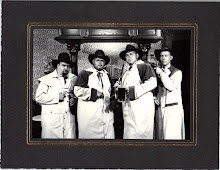To get to the bottom of things, Dr. Harvard and I began to play a little game I liked to call "Guess What I DON'T Have." I'd go in, get a test done, then go back a week later, get the results, and Dr. Harvard would tell me what that particular test had been for and what ailment I didn't have. It went something like this, "I got your blood work back. The good news is that you don't have rheumatoid arthritis. The bad news is that there's still several other things we need to test for." And then I'd be off for another test.
One of the more annoying aspects of this whole process is that it made me miss a lot of time at school. The sophomores I taught barely noticed I was ever gone, unless it was a day I was scheduled to read aloud. My juniors and seniors were a little more perceptive that being gone a lot must have meant something was up. I had a Creative Writing class I was particularly fond of, and one day when I told them that I would, once again, be gone the next day a student piped up, "Why are you gone all the time? Are you dying or something?"
It was a very strange, almost surreal moment, because I looked at them and said, very seriously, "I don't know."
Having gotten used to my sense of humor, many of them laughed. But many of them didn't. many of them seemed to understand that something was wrong. As this sank in, the class began to ask questions. I finally just told them the abbreviated story -- that there was something wrong with my kidneys, but they didn't know what. That just led to more questions -- How long had I had this? What did I think it was? My grandma had to go to dialysis, do you do that? Are you going to need a transplant?
The transplant question kind of blindsided me. I don't know why, but for the first time the severity of the situation, if it came to that, was pretty grim. I opened up, perhaps too much m, and told the class that I was adopted, didn't know (or want to find) my biological parents, and that the only blood relative I had to turn to for a donor was all of four years old. It was kind of a downer to think about that. But I felt better when a student approached me after class and said, "Mr. Clamons, if you need a kidney, I'll give you one of mine. . . I'm serious."
Now I don't want you to think that everything was completely gloom and doom. Creative Writing class became a bit of an outlet for me to get over things. Each day they had a writing prompt for the beginning of class. I began to work in some topics that had come to me during this whole process. The movie, The Bucket List, had not yet been released, but we did write a bucket list of things I should if everything went South on me. My favorite of this was having a student say, "You have to do open-night mic at a comedy club." When I pointed out that the only reason they thought I was funny was because my jokes were about them or their classmates, the student said, "That's alright. We'll all come so somebody laughs at you."
There was also a time when I had to go in for an MRI. I was not looking forward to my 10:00 PM appointment to lay in the tube (if you're wondering, I didn't get IN the tube until 10:45), and told the class the next day that I might be grouchy because I had to stay up late for an MRI (once I got in, it still took 35 minutes to complete the MRI). I was asked why i had to have an MRI, and I explained that it was to see if I had malformed kidneys, structural problems, or cancer. As it is in most cases, when I mentioned the word "cancer" a silence came over the room. I decided to keep my humor about me and told the class how I had developed a Top 10 list of positives about having cancer. If you're wondering, here's some of the highlights of it:
- Finally have an explanation for my haircut
- Time off from work -- and you meddling kids (that's a direct quote)
- It's the first step to winning seven consecutive Tour de Frances
- Society will find it OK if I dump my wife to date Sheryl Crow
- Radiation treatment could cause me to grow super strong whenever I get angry. . .and you wouldn't like me when I'm angry.
Overall, it turned out that waiting wasn't so bad. And sharing with my students became a bit cathartic for me and helped me to keep my mind off the waiting. So when I went to see Dr. Harvard and he told me it was time for one last test, I remained upbeat and faced this test with a positive mental attitude. Boy, was I stupid.
Next time: I Scream, You Scream, We All Scream for Kidney Biopsies!
